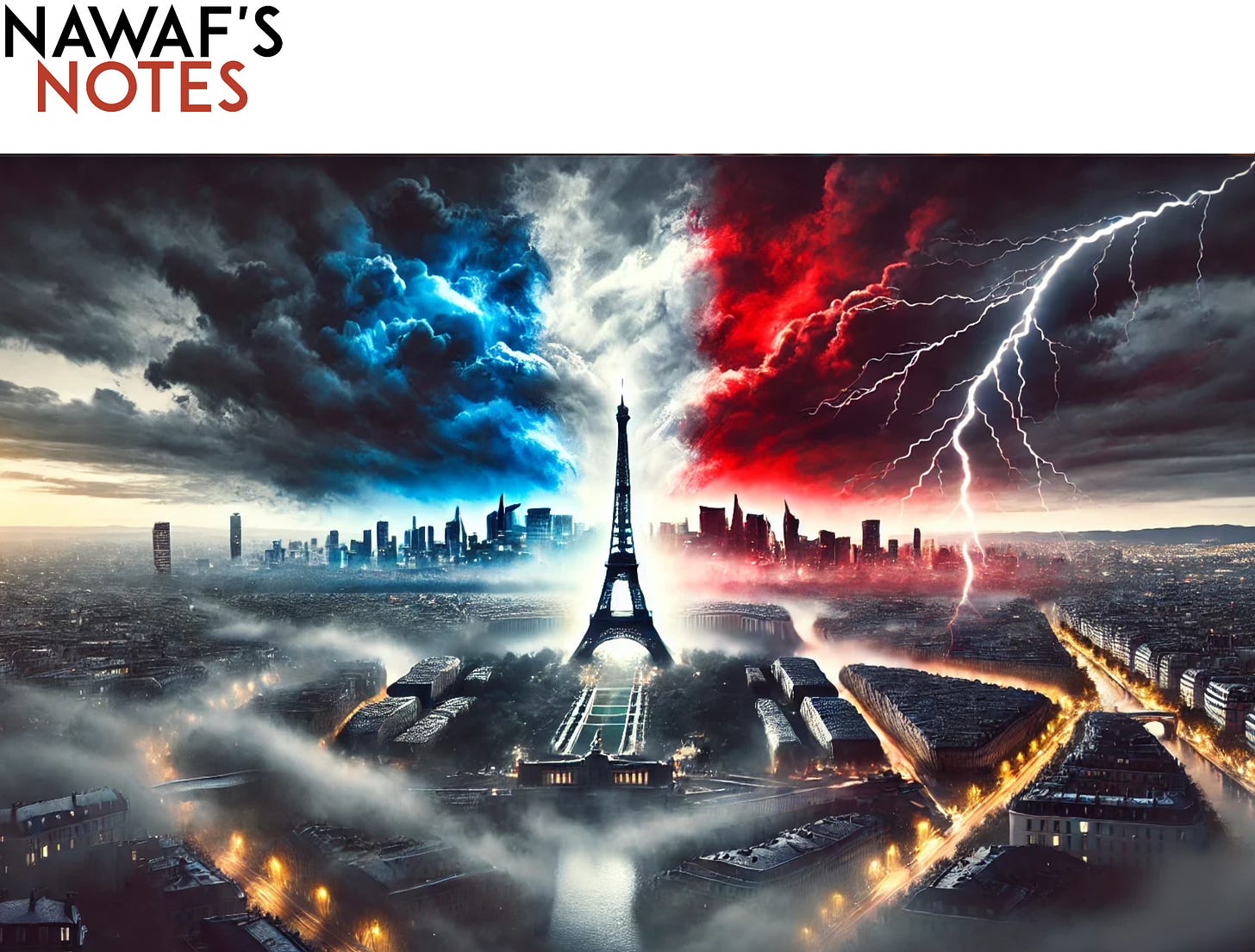Nawaf's Notes: The French Elections, A Political Earthquake with Global Repercussions.
France’s leftist New Popular Front wins most seats, reshaping politics and signaling potential foreign policy shifts amid parliamentary uncertainty.
The following is based on the author’s original Arabic article published in Qatar’s Al-Raya Newspaper on July 10, 2024, 1…
In an unexpected and historic shift, the leftist "New Popular Front" (NFP) has won the most parliamentary seats in the French elections, halting the momentum of the far-right National Rally (RN). This seismic change in France's political landscape is set to reverberate beyond its borders, potentially reshaping France’s stance on global issues such as the war in Ukraine, the conflict in Gaza, and international relations at large.
A Surprising Victory
The dramatic turnaround followed President Emmanuel Macron’s controversial decision to dissolve the National Assembly. Intended to consolidate his power amidst the rising far-right, the move backfired. Disillusioned by Macron’s centrist policies and alarmed by the far-right's surge, the electorate swung left, rallying behind a coalition promising comprehensive economic and social reforms. The NFP, an alliance comprising the far-left France Insoumise, socialists, and moderate environmentalists, now holds the most seats, albeit without an absolute majority.
Jean-Luc Mélenchon, the leader of France Insoumise, has emerged as a central figure in this new political landscape. His vision of a more equitable and socially just France resonated with voters seeking an alternative to both Macron’s centrism and the far-right’s nationalism.
France’s Evolving Stance on the Ukraine War
The influence of the NFP is poised to pivot France’s position on the Ukraine war. Historically, the French left has advocated for a balanced approach, emphasizing diplomacy over military intervention. Mélenchon has consistently championed negotiations and de-escalation, contrasting sharply with Macron’s unwavering support for Ukraine and firm stance against Russia. As the NFP consolidates its power, the international community will scrutinize whether France will shift its course, potentially advocating for peace talks and re-evaluating sanctions on Russia.
France might push for a more nuanced policy that seeks to mediate rather than exacerbate the conflict. This could alter dynamics within the European Union and NATO, introducing a voice calling for diplomatic resolutions and potentially challenging the prevailing hardline approach.
A New Approach to the Conflict in Gaza
The triumph of the NFP also signals a potential transformation in France’s policy towards the Gaza conflict. The leftist coalition has long emphasized Palestinian rights and humanitarian aid, steadfastly advocating for the Palestinian cause. Mélenchon’s recent condemnations of the violence in Gaza and his calls for increased support for Palestinian rights hint at a forthcoming shift in France’s diplomatic posture. This change could see France adopting a more vocal and proactive role in advocating for peace and justice in the region, potentially straining relations with Israel while aligning more closely with other pro-Palestinian nations.
Historically, France has maintained a balanced stance in the Israeli-Palestinian conflict, supporting a two-state solution while upholding its relationship with Israel. A recalibrated French stance under the NFP might lead to renewed efforts in international forums to address the humanitarian crisis and support a viable two-state solution. This shift could influence broader European and global policies, encouraging a re-examination of strategies aimed at resolving the Israeli-Palestinian conflict.
Towards a Multilateral Diplomatic Model
The rise of the NFP may herald a broader shift towards a more multilateral and cooperative foreign policy. The coalition’s platform, emphasizing social justice, environmental sustainability, and global solidarity, suggests that France could prioritize international cooperation on critical issues such as climate change, social justice, and peace-building efforts. This shift could rejuvenate alliances with other progressive governments and international organizations, positioning France as a leader in advocating for global equity and sustainability.
Specific initiatives that the NFP might champion include rejoining international climate agreements with renewed vigor, increasing foreign aid focused on sustainable development, and spearheading global efforts to address social inequalities. By championing progressive values on the world stage, France could inspire a reconfiguration of global alliances, fostering a more inclusive and cooperative international order.
Political Deadlock or New Beginnings?
Despite the electoral victory, the NFP faces the challenge of governing without an absolute majority, raising the specter of political deadlock. Macron’s decision to dissolve the National Assembly might now haunt his administration, as his attempt to thwart the far-right has inadvertently empowered the resolute left. The question now is whether Macron and the NFP can navigate this new political landscape and find common ground.
The coexistence of Macron’s administration with the NFP will test the resilience of France’s political institutions. Potential coalition-building and political negotiations within the National Assembly will be crucial. Compromises on key issues, ranging from economic reforms to foreign policy, might be necessary for effective governance. The ability of these divergent forces to collaborate on critical national and international issues will be crucial in determining the country’s future trajectory. As France stands at this political crossroads, the world watches closely, anticipating the far-reaching implications of this unprecedented electoral outcome.
Final Note …
In conclusion, the unexpected victory of the New Popular Front in the French parliamentary elections marks a pivotal moment with profound global repercussions. From altering France’s stance on the Ukraine war and the Gaza conflict to potentially ushering in a new era of multilateral diplomacy, this political earthquake will reshape France's role on the international stage. The coming months will reveal whether this shift leads to transformative change or entrenched political stalemate, but one thing is certain: France’s political landscape will never be the same again.
(La politique est l'art de mentir à propos)






